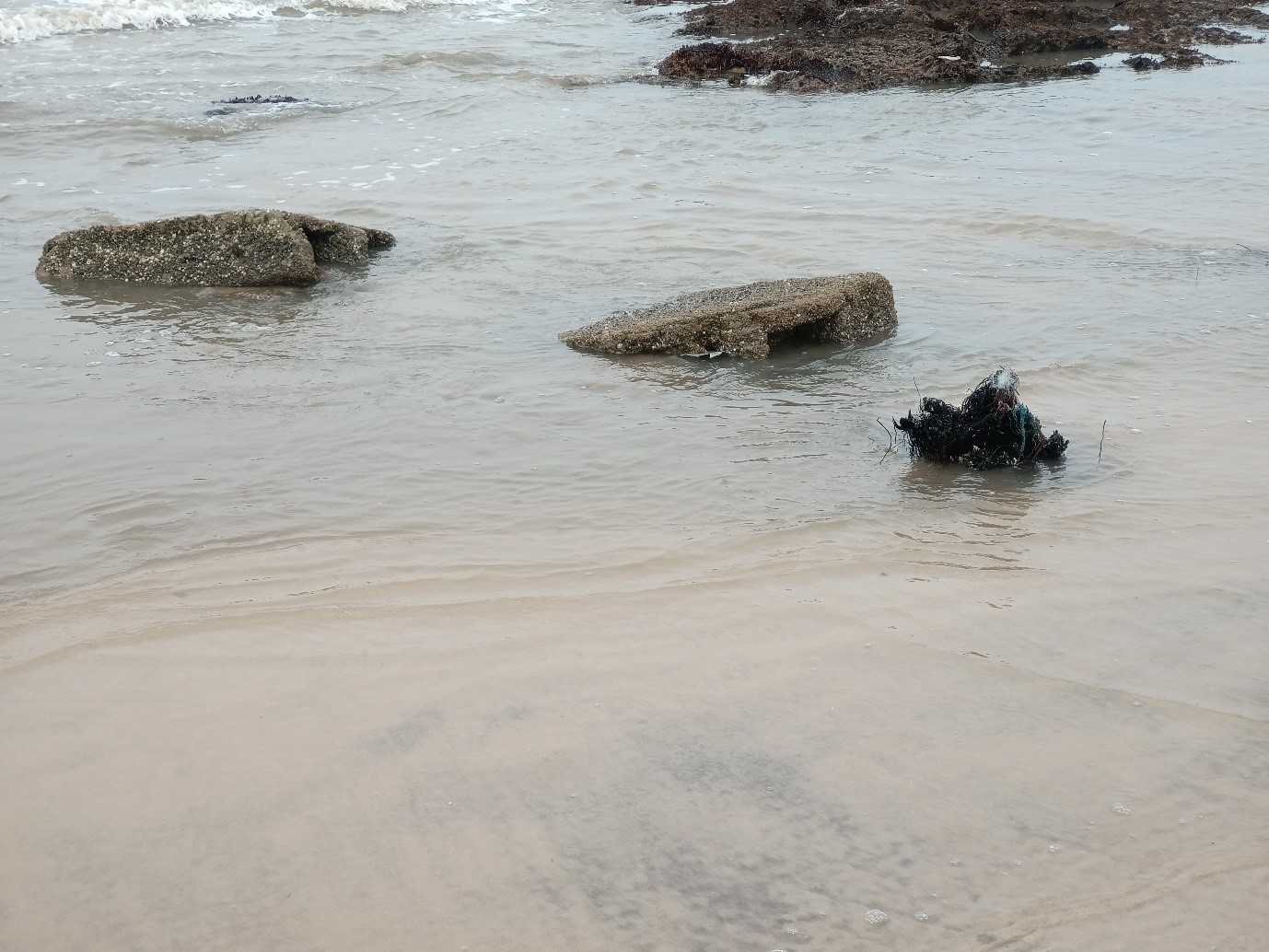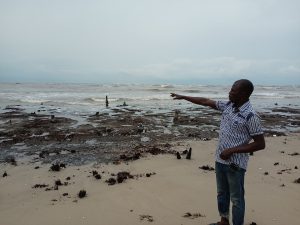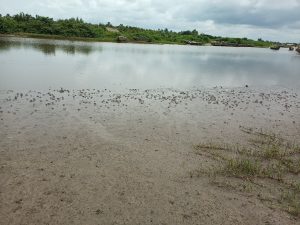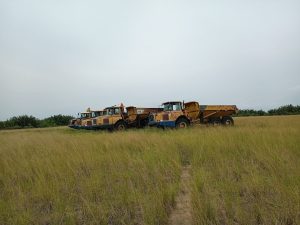How Climate Change is Throwing Niger Delta into peril, Displacing Thousands, Devastating Livelihoods

By Ekemini Simon
14 years ago, about 10,000 people lived in Itakabasi, a thriving coastal community across the Qua Iboe river in Akwa Ibom State. They were renowned as the home of affordable fishes, crustaceans and mollusks. But that was back then when there was still soil beneath their feet. Now, the indigenous population in this area have lost their home and livelihood to climate change.
Loveday Loveday, a father of six who had lived a relatively comfortable and contented life, going about his fishing business in the community until disaster struck in August 2010 gives a glimpse of the experience of fisherfolks here.
An unprecedented flood and erosion in the history of oil-rich Akwa Ibom- a Niger Delta State, had swept more than three quarters of this once lively coastal community into the Atlantic Ocean. Loveday was among those who lost their huts and fishing boats to the tragedy. He was only fortunate not to be among the 23 people who lost their lives from the disaster.
As the dry season set in, the flood water rescinded and left about two quarters of the community for the fisher-folks to manage. With hope and zeal to move on against the climate disaster, Loveday rebuilt his hut, got a loan and acquired a new fishing boat.
Eight months into rebuilding himself came the last straw that broke the camel’s back. In July 2011, the sea level of the Atlantic Ocean had risen to the extent of washing away the entire community of Itakabasi.
Other communities like Okoroitak, Iwokpom and Okoroiwang were also affected by this ecological crisis. But Itakabasi was the worst hit. They never recovered.
No single house was spared in Itakabasi and many fishing boats including Loveday’s were again lost. His family and that of the entire community lost their home of birth and had to seek refuge in a nearby community, Okoroitak down to this day. For months, they relied on relief efforts to survive.
Increased intensity of storm surges, flooding, and damage to coastal areas as experienced in Itakabasi have been identified by experts as a consequence of sea level rise which is an impact of climate change. But the problem does not appear to abate. According to a 2024 assesment by the United States National Aeronautics and Space Administration (NASA), the global sea level rose by 0.11iches (0.27 centimetres) from 2021 to 2022. The report adds that based on long-term satellite measurements, the projected rate of sea level rise will hit 0.26 inches (0.66 centimetres) per year by 2050.
Fisherfolks Displaced
A trip to Itakabasi is a sobering experience in today’s world of sea level rise (SLR) especially in the Niger Delta blessed with a very large coastline.
No single house is left. The only memory existing is a pillar of wood in the ocean preserved as a remembrance of the village Head’s house.

The Village Head of Okoroitak, Chief Etor Abakam, describes the situation of the people of Itakabasi which he accommodates as pathetic.
He said “Even the Village Head of Itakabasi now resides in my domain, Okoroitak. I have given him a land to stay. Those who came from Itakabasi to stay in my village are quite many and life is very difficult for them. They have been stranded and the government needs to come to their aid so that their lives can improve”.
Even those in Okoroitak are not safe. The water keeps pushing them upland. A community leader in the area, Godwin Tom showed this newspaper a space where people once resided but have now been forced to evaluate due to the threats of the sea level rise.
“It was never like this when I was young. It was never like this. The ocean is penetrating and people are moving. Where people see a little highland, they build. It can happen that before the year ends, the nearby highland is affected and people will continue to move and look for other settlements“, Tom noted in despair.

Child education frustrated
Besides the pains of losing an ancestral home due to the sea level rise, the climate crisis has impacted in no small measure on child education and put many more lives at risk in an attempt to go against the odds.
Itakabasi once had a primary school. But when this reporter visited in May, the school had been washed away by the sea. Few ruins- casted beams of the building are found near the sea shore.
For over 13 years after the flood sacked this community, parents who wished to fight the odds for their children to enroll in school had to abandon their fishing business, journey their children with boats across the Qua Iboe river to schools in Ibeno mainland.
“Without us using our boat to Journey our children to school, there is no way out. It was only last year that the government opened a primary school at Okoroitak which allows students to now go to school. Before now, we used to take them across the river to Mkpanak so they could attend school. When it is time to return, we take our fishing boats to bring them back. It was a very big risk”, says Loveday.
He noted that there were a few times children who were taken to school lost their lives due to boat mishap and there are others born after the displacement who have never been enrolled in school due to the difficulty of accessing a school across the sea.
Findings reveal that this has contributed negatively to the poor school enrollment record of Akwa Ibom State. The State ranks second highest in out-of-school children according to a report by the National Bureau of Statistics. The experience in Itakabasi also corroborates UNICEF’s latest report that African Children are at high risk or extremely high risks of the impacts of Climate Change.
Sea level rise frustrates fishing businesses
Fisherfolks in fishing communities of Akwa Ibom State rely on artisanal fishing which is the use of traditional fishing gears like dugout boats and nets for fishing. Yet, catches have dropped drastically in recent years. They attribute this to the rise in sea level.
Loveday, who has over 30 years of experience in the fishing business explains how ” We had places where we could easily stand and catch fishes with our nets. We had fishes close to the shore. But now, the water has become so big and these fishes are no longer accessible with our fishing equipment.
He said going into the deep waters to fish is riskier with the type of fishing equipment at their disposal and most times does not yield results due to high oil pollution in the deep waters and high cost of fuel they need to use.
Yet, over the years, funds have been provided to assuage the ecological challenges faced by these vulnerable communities. But has it yielded the expected result?
Ecological Fund Fails to Give Succour
There are diverse sources of funding that have been set aside for the remediation of ecological challenges facing environmentally endangered communities.
A case in point is the ecological fund. Under the prevailing revenue allocation formula from the Federation Account Allocation Committee, 2.32 per cent of derivation funds are set aside for ecology and disaster management.
Of this amount, the 36 states and the FCT get 0.72 per cent; the 774 local governments get 0.6 per cent, adding to 1.32 per cent with a balance of one per cent to the government of the federation.
Of the federal government’s one per cent, the National Emergency Management Agency (NEMA) takes 20 per cent, the North East Development Commission (NEDC) receives 10 per cent, the National Agricultural Land Development Authority (NALDA) 10 per cent, while the National Agency for the Great Green Wall (GGW) gets 0.5 per cent; leaving 0.55 of the one per cent to the government at the centre for ecological protection and disaster management.
Checks into the portal of the Ecological Funds Office of the Federal Government turned out results for projects awarded between 2015 and 2017. Of the 88 projects listed across the country, two projects were awarded to Akwa Ibom State, gully erosion control at Ini and Eket local government areas. But they were all listed as uncompleted projects.
At the State level, the government of Akwa Ibom State over the years has received billions of naira from ecological funds. For instance, according to data from the Federation Account Allocation Committee (FAAC), in the 15 months period of January 2024 to March 2025 Akwa Ibom State had N1.8bn as ecological funds.
However only half of the funds went to the State coffers. Section 14 (2c) of the Niger Delta Development Commission (NDDC) Act 2000 provides that among the funding streams of the NDDC will be 50 percent of monies due to member States of the Commission from the Ecological Fund. Data from FAAC shows that N900m was deducted to NDDC leaving the State with N900m for the 15 months period.
Yet, analysis of the Akwa Ibom State budgets and financial statements between 2015 and 2024 reveals that although the State Government through the Ministry of Environment has been making budgetary provision for ecological matters, erosion and flood control, these projects are only implemented within the capital city without recourse to coastal communities deeply affected by ecological crisis.
Even though Ibeno local government area during the same period had N43.98m as ecological funds of which half was deducted to NDDC. They also had N2.44bn net allocation. Findings revealed that no ecological project was embarked upon by the council within this period.
Having noticed that the ecological funds have failed to yield the intended result, the House of Representatives in 2022 launched a probe into the utilization of the fund for the past 10 years.
What is more, NDDC has continued to draw 50 percent of ecological funds paid to both the State and local government area each month.
However, investigations reveal that NDDC is yet to have an ecological project completed in Ibeno. The Commission however undertook a remediation project in 2012. A contract for shoreline protection of Itakabasi, Okoroitak, and Ikotiwang was awarded by the commission. However, the community leaders of Okoroitak told this newspaper that the company abandoned the project in 2014. This newspaper observed that a size of a football field was sand-filled at Okoroitak but the machines have been abandoned after the work stopped.

Policy Alerts calls for Review of Niger Delta Master plan
Policy Alert, a Civil Society Organisation working of fiscal and ecological justice in the Niger Delta has called for the review of Niger Delta Master plan.
The organisation through its Executive Director, Tijah Bolton-Akpan in an interview with this newspaper said there is a need for the leaders of the region and current administration to review the Niger Delta master plan and incorporate some funding mechanism that will ensure the right volume of resources are invested in the region thus deal with the impact of climate change bedevilling the region.
The Executive Director recommended that the government needs to recognize that the problem Niger Delta has to deal with is double jeopardy as communities are not just vulnerable to climate change but stand at the fence line of destructive fossil fuel extraction.
He said recognizing this will imply that the scale of resources voted to address the issues affecting the region needs to be doubled and accountability in the utilisation of such specialized funds ensured.
Bolton-Akpan added “We are talking about loss and damage funds within the international climate discussion. I do not think there is any jurisdiction around the world that qualifies to attract funds for loss and damage adaptation more than the Niger Delta.”







